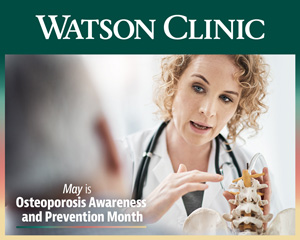
Healthy bones are strong and dense with minerals such as calcium. But when bones lose mass and mineral density (due to age or other reasons), a disease called osteoporosis can result. Eventually, osteoporosis can cause your bones to become thinner, weaker and more prone to fractures (breaking).
Osteoporosis is called a silent disease because it usually has no symptoms. You may not even know you have it until you break a bone. Osteoporosis-related fractures occur most frequently in the wrist, spine and hip, but they can happen anywhere in the body.
Anyone can get osteoporosis at any age. But some circumstances can make it more likely. Some of the most common risk factors are:
• Age. People 65 or older are at higher risk.
• Sex. Women, who have smaller bones and less bone mass than men, are more likely to develop the condition.
• Ethnicity. White and Asian women are at greatest risk, followed by African American and Hispanic women. White men are more likely to develop osteoporosis than African American or Mexican American men.
• Lifestyle. Smoking, heavy alcohol use, not getting enough calcium and vitamin D, and a lack of regular physical activity can increase bone loss.
• Small body size.
• Family history of hip fracture or osteoporosis.
• Low estrogen or testosterone levels.
These tips can help you keep your bones strong and healthy:
• Exercise regularly. Include weight-bearing exercises.
• Eat a healthy diet. Choose foods rich in calcium, vitamin D and protein, as well as a lot of fruits and vegetables.
• Avoid smoking and excessive alcohol use.
According to the U.S. Preventive Services Task Force (USPSTF), women over age 65 should be screened for osteoporosis with a bone mineral density (BMD) test. Women of any age with risk factors for osteoporosis also should be screened. Currently, the USPSTF does not have osteoporosis screening recommendations for men.
The most common screening test for osteoporosis is called a DEXA bone density scan. This simple, painless test takes x-ray pictures of the inside of your body—usually your lower spine and hips—to diagnose osteoporosis. The scan can also show how well the osteoporosis treatment is working and assess your risk for fractures. DEXA scans are available by physician referral only.
Watson Clinic’s
Rheumatology department specializes in the diagnosis and treatment of osteoporosis and other inflammatory conditions. Call 863-680-7486 to schedule an appointment from our
Watson Clinic Main location in Lakeland.
Sources: National Institute of Arthritis and Musculoskeletal and Skin Diseases; RadiologyInfo.org; UpToDate